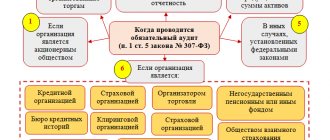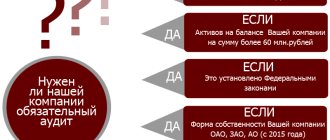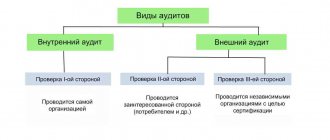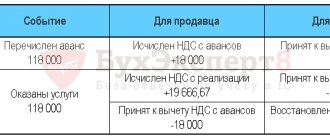Free legal consultation by phone:
8
This is a service provided by many companies. However, today there are certain reasons for carrying out this procedure without fail. Such criteria will be discussed below. However, it’s worth saying right away that if you find reasons to carry out such a set of works in your company, you will thereby receive the following advantages:
- minimizing tax and financial risks;
- avoiding penalties;
- reducing the load on the accounting department;
- uniform distribution of costs.
Thus, this procedure is carried out today everywhere in many enterprises. Otherwise, the law may punish an LLC that refuses it with a fine.
Mandatory audit of accounting (financial) statements for 2018
The list of cases of mandatory audit of accounting (financial) statements for 2021 is given in Letter of the Ministry of Finance of the Russian Federation dated January 15, 2019, No. b/n.
Thus, the following are subject to mandatory audit:
- state corporations and companies, state companies (clause 2 of article 7.1 and clause 8 of article 7.2 of the Federal Law of January 12, 1996 No. 7-FZ);
- microfinance companies (clause 4 of article 15 of the Federal Law of July 2, 2010 No. 151-FZ);
- lottery operators (Article 23 of the Federal Law of November 11, 2003 No. 138-FZ);
- organizers of gambling (clause 12 of article 6 of the Federal Law of December 29, 2006 No. 244-FZ);
- management companies and specialized depositories carrying out activities provided for by Federal Law No. 117-FZ of August 20, 2004 (clause 1 and clause 2 of Article 29 of Law No. 117-FZ);
- housing savings cooperatives (clause 1 of article 54 of the Federal Law of December 30, 2004 No. 215-FZ);
- credit cooperatives, if the number of individuals who are its members exceeds 2,000 people (Clause 1, Article 31 of the Federal Law of July 18, 2009 No. 190-FZ);
- organizations that are self-regulatory organizations (clause 4 of article 12 of the Federal Law of December 1, 2007 No. 315-FZ);
- organizations that are developers that attract funds from participants in shared construction for the construction of apartment buildings and (or) other real estate (except for industrial facilities) (clause 5 of article 3 of the Federal Law of December 30, 2004 No. 214-FZ);
- tour operators operating in the field of outbound tourism (if the total price of the tourist product in the field of outbound tourism for the previous year amounted to more than 400 million rubles) (Article 17.7 of the Federal Law of November 24, 1996 No. 132-FZ);
- other organizations in cases established by Federal laws.
Auditing organizations and the Central Bank register
- An audit organization will be able to enter the Central Bank register if it has at least 7 auditors on staff at its main place of work (before January 1, 2023), and after this date - from 12.
- At the same time, at least three full-time employees must meet requirements similar to those for the head of the audit of socially significant organizations (PSO).
- It will no longer be possible to have “bad” auditors among employees.
- A number of other requirements are also introduced: the firm’s audit experience for at least the last three years; absence of violations of independence rules within the same period;
- Cases are also established when an audit firm can be excluded from the register, for example, repeated violations of independence rules over five years.
- It will be established that the audit organization does not have the right to transfer information and documents constituting an audit secret to third parties, or to disclose this information without the prior written consent of the Bank of Russia and the audited entity, except in cases provided for by law.
The status of a small business entity does not always save you from an audit
Let us recall that on June 20, 2021, Order No. 64n of the Ministry of Finance of Russia dated May 16, 2016 came into force, changing simplified accounting methods for small and non-profit organizations. This means that small companies will be able to prepare reports for 2021 using simplified forms. A simplified reporting procedure can be used by organizations that are allowed to conduct accounting in a simplified way.
MANDATORY AUDIT
Such organizations include (Article 7 of the Law of December 6, 2011 No. 402-FZ “On Accounting”):
- small businesses;
- NPO;
- organizations that have received the status of participants in the Skolkovo project.
The criteria by which companies are classified as small businesses are established by Federal Law No. 156-FZ dated June 29, 2015:
- the amount of revenue for the previous year from the sale of goods, works or services (excluding VAT) does not exceed 800 million rubles;
- the average number of employees is no more than 100 people;
- the share of third parties in the authorized capital of the company is no more than 49 percent.
Such small companies can conduct accounting in a simplified way. The indicators of the accounting reporting items also depend on the chosen method of accounting.
But the situation changes dramatically if a small company is subject to mandatory audit. In this case, the company is faced with the need to generate a complete set of financial statements, ensure that differences between accounting and tax accounting are maintained in the accounts (i.e. apply PBU 18/02*, approved by Order of the Ministry of Finance of the Russian Federation dated November 19, 2002 No. 114n), create a reserve for vacation pay (i.e. apply PBU 8/2010, approved by Order of the Ministry of Finance of the Russian Federation dated December 13, 2010 No. 167), etc.
Note*
It is possible to refuse to use PBU 18/02 only if a small enterprise has the right to use simplified methods of accounting. And “little ones” who are subject to mandatory audit do not have the right to do this (clause 1, clause 5, article 6 of Law No. 402-FZ).
If a company applies special tax regimes (UTII, simplified tax system, unified agricultural tax), then PBU 18/02 can not be applied, having stated this in the accounting policy.
Usually
, a small enterprise with the organizational and legal form of a joint-stock company is deprived of such simplified benefits (clause 1, clause 1, article 5 of the Federal Law of December 30, 2008 No. 307-FZ “On Auditing Activities”, hereinafter referred to as Law No. 307-FZ ). At the same time, the legislation of the Russian Federation provides for a special procedure for conducting a mandatory audit in a joint-stock company, in the authorized capital of which there is a certain share of state participation (clause 4 of article 5 of Law No. 307-FZ).
The “baby” may have revenues from the sale of products (goods, works, services) for the previous reporting year amounting to more than 400 million rubles, or the amount of balance sheet assets at the end of the previous reporting year - more than 60 million rubles (clause 5, clause 1, art. 5 of Law No. 307-FZ). And in this case, a small enterprise is subject to mandatory audit and you can forget about simplified forms of accounting reporting.
AUDITOR CONSULTATION
What is statutory audit
Statutory audit is a mandatory audit of the accounting and financial (accounting) statements of an organization or individual entrepreneur. In the Russian Federation, statutory audit is regulated by the Federal Law “On Auditing Activities” dated December 30, 2008 No. 307-FZ. Federal Law No. 444-FZ dated November 28, 2018 amended Art. 18 of the Law “On Accounting”. According to the changes made, the Federal Tax Service of Russia will be involved in the formation and maintenance of the state information resource.
In accordance with the Federal Law of August 7, 2001 No. 119-FZ “On Auditing Activities”, mandatory audits must be carried out by audit firms (clause 2 of Article 7 of Law No. 119-FZ). They carry out audits on the basis of a license to provide audit services. This requirement is established in paragraph 2 of Art. 4 of Law No. 119-FZ. It is worth noting that licensing of auditing activities is terminated. These amendments were introduced by Federal Law No. 135-FZ into Federal Law No. 128-FZ “On licensing of certain types of activities”.
Based on the results of the audit, an auditor's report on the financial (accounting) statements is drawn up. It is an official document intended for users of financial (accounting) statements of audited entities. The conclusion contains the opinion of the audit organization on the reliability of financial (accounting) statements and on the compliance of the accounting procedure with the legislation of the Russian Federation (clause 1 of Article 10 of Law No. 119-FZ). The form, content and procedure for presenting the report are determined by Rule (standard) No. 6 “Audit report on financial (accounting) statements” (clause 2 of Article 10 of Law No. 119-FZ). The auditor's report is included in the financial statements (clause “d”, paragraph 2, article 13 of the Law “On Accounting”).
What if, contrary to the law, the company submits reports using simplified forms?
In the event that the balance sheet and financial results report are presented in simplified forms instead of the generally established (full) forms, or failure to submit certain forms of reports (appendices) may result in the company and its officials being held liable under clause 1 of Article 126 of the Tax Code of the Russian Federation, Part. 1 Article 15.6 of the Code of Administrative Offenses of the Russian Federation.
And according to clause 1 of Article 126 of the Tax Code of the Russian Federation, failure by the taxpayer to submit documents and (or) other information provided for by the Tax Code of the Russian Federation and other acts of legislation on taxes and fees to the tax authorities within the prescribed period entails a fine of 200 rubles for each document not provided.
INITIATIVE AUDIT
Results
The criteria for mandatory audit are specified in paragraph 1 of Art. 5 of Law No. 307-FZ. Checks cannot be avoided if the business entity is engaged in specific types of activities (publicly places securities, organizes gambling) or meets other criteria (type of organizational and legal form, revenue indicators).
You can find more complete information on the topic in ConsultantPlus. Free trial access to the system for 2 days.
How is the fine amount calculated?
When calculating the fine, the full list of documents that the company must submit is taken into account (letters of the Federal Tax Service of the Russian Federation dated November 16, 2012 No. AS-4-2/19309, Ministry of Finance of the Russian Federation dated May 23, 2013 No. 03-02-07/2/ 18285).
Thus, as part of the financial statements for 2021, the company must submit:
- balance sheet;
- income statement;
- statement of changes in equity;
- cash flow statement;
- explanations in tabular and text forms.
If the company fails to submit its financial statements on time, the fine will be 1,000 rubles (200 rubles × 5).
If the financial statements are not submitted to Rosstat of the Russian Federation in full, an administrative fine will be charged.
The head of the company faces a fine of 300 to 500 rubles, and the company itself can be fined in the amount of 3,000 to 5,000 rubles (Article 19.7 of the Administrative Code, letter of Rosstat of the Russian Federation dated February 16, 2016 No. 13-13-2/28-SMI) .
AUDIT OF JOINT STOCK COMPANY (JSC)
Tax and administrative liability for failure to conduct a mandatory audit
You may be misled by the information that there are no penalties for failing to undergo a mandatory audit of an organization. This issue should be clarified separately, since confidence in impunity can be very costly for a company. Avoidance of mandatory audit is a gross violation of accounting reporting requirements. Indeed, no liability for failure to pass an audit is specified in the laws. However, an organization can be fined for the lack of an audit report (which, in turn, you cannot obtain without going through the procedure) under a number of laws. Let's take a closer look at what consequences may occur if an organization has not conducted a mandatory audit. The absence of an audit report from organizations for which inspection is mandatory is considered a gross violation of accounting.
Thus, for the absence of a mandatory audit report, the manager will be fined in the amount of 5 thousand to 10 thousand rubles, and for a repeated audit a fine of 20 thousand rubles is possible (Article 15.11 of the Code of Administrative Offenses of the Russian Federation). The provisions of Parts 7 and 8 of Art. 14.25 of the Code of Administrative Offenses of the Russian Federation provides for the following fines/sanctions for responsible officials for this violation:
- 5-10 thousand rubles - for a single violation;
- 10-50 thousand rubles or disqualification for a period of 1 to 2 years - in case of repeated violation.
The statute of limitations for this article is only 3 months. When an auditor's report is not attached to the annual reports, and its presence is required by law, this also falls under a gross violation of the requirements for accounting (financial) reporting, which must be analyzed by third-party auditors (Part 1 of Article 15.11 of the Code of Administrative Offenses of the Russian Federation). If an organization, by virtue of the law, must conduct a mandatory audit of its annual reports, it means that an audit report must be submitted to the local branch of Rosstat at the place of registration, along with a copy of the financial statements. Moreover, to be on time. Otherwise, penalties in accordance with Art. 19.7 of the Code of Administrative Offenses of the Russian Federation for mandatory audit are as follows:
- for a legal entity – from 3 to 5 thousand rubles;
- for an accountant - from 300 to 500 rubles.
Clause 2 of Article 15.23.1 of the Code of Administrative Offenses of the Russian Federation provides for fines for failure to provide an audit report at the request of a shareholder:
- from 20 thousand to 30 thousand rubles for officials;
- from 500 thousand to 700 thousand rubles for legal entities.
According to Art. 15.19 of the Code of Administrative Offenses, for violation of the law regarding the disclosure of information about the activities of joint-stock companies that publish their accounting (financial) statements and the auditor’s report on them, a fine of 500 thousand to 700 thousand rubles is imposed. In this case, the Bank of Russia may apply the following sanctions:
- imposition of administrative fines from 30 thousand to 50 thousand rubles on officials or disqualification for a period of 1 to 2 years;
- fine for legal entities (JSC as a whole) from 700 thousand rubles to 1 million rubles.
Rosstat may levy fines for the lack of an audit report:
- from 300 to 500 rubles for officials;
- from 3 thousand to 5 thousand rubles for legal entities.
The audit report must also be submitted to statistics. If this is not done, the company will be fined from 3,000 to 5,000 rubles. For a manager, the sanction is lower - 300 - 500 rubles. (Article 19.7 of the Administrative Code). For small and medium-sized businesses, inspectors can replace the fine with a warning. If a mandatory audit report is not published or presented to shareholders, the company may be fined from 500,000 to 700,000 rubles, and the manager - from 20,000 to 30,000 rubles. (Part 1 of Article 15.19, Part 2 of Article 15.23.1 of the Code of Administrative Offenses of the Russian Federation). Administrative legislation provides for the possibility of holding an organization accountable for failure to comply with the rules for providing information for publication in the electronic register.
With regard to tax liability for failure to conduct a mandatory audit, we note that according to Article 120 of the Tax Code of the Russian Federation for a gross violation of the rules for accounting for income and (or) expenses and (or) objects of taxation, if these acts were committed during one tax period, in the absence of signs of tax for violations, the company is subject to a fine of 10 thousand rubles.
Sphere of influence of the Bank of Russia
- The frequency of control and supervisory activities on the part of the Central Bank in relation to those who audit the SEO will be determined by the Central Bank using a risk-based approach, while according to the law, scheduled inspections by the Central Bank are threatened no more than once a year.
- At the same time, the Central Bank will be able to conduct unscheduled inspections if signs of violations are detected based on the reporting of the audit organization, various complaints and information from the media and other sources.
- The Central Bank will also penetrate into the sphere of conducting qualification exams, in particular, it will establish the procedure for their conduct in agreement with the authorized body
A huge number of other amendments are also being introduced.
- 26 / Jun / 2018
- audit






